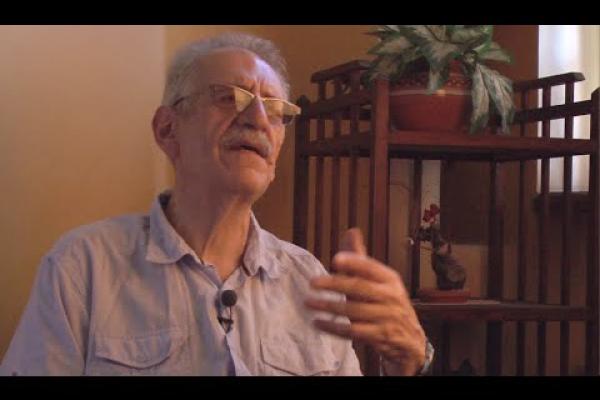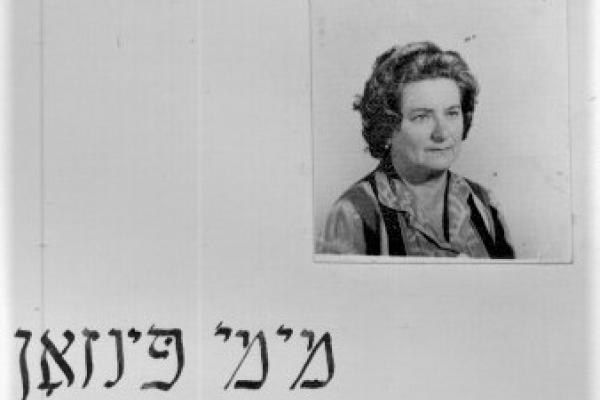"A Guest Came to Visit" and "Sketches"
By Yankev (Jacobo) Flapan, translated by Claire Breger-Belsky
Yankev (Jacobo) Flapan writes prayers and odes and narratives, at times deeply personal and at times more outward-facing and political, often centering experiences of poverty and oppression among the working classes. His poems are characterized by the personification of natural and architectural objects and what could perhaps be considered the de-personification of people and bodies. In most of these poems, references to place are subtle—a peso here, a place name there. And yet, through both these subtle markers and the way certain poems distinguish between a “there”—clearly Europe—and a “here”—clearly his current home in Argentina—it becomes clear that his writing is grounded explicitly, specifically, in Argentina, in its streets, its landscapes, its life, and its poverty.
“A Guest Came to Visit” appeared in the Buenos Aires–based communist journal Nayvelt (New World) in the September–October 1928 issue. “Sketches” was first published in Flapan’s second short story collection, Trep (Step, 1930), and then reprinted in a slightly different version in the 1944 Antologye fun der yidisher literatur in Argentine (Anthology of Yiddish Literature in Argentina). The full piece—at its most poetic in the section excerpted here—comprises six (in 1930) or four (in 1944) sketches of life on the impoverished streets of Buenos Aires; each section can stand alone and highlights Flapan’s voice, his stark and startling poetic imagery, and his tendency toward personification. — Claire Breger-Belsky
A Guest Came to Visit
I whitewashed the walls of my heart,
covered the floor with damp yellow sand,
and for a while my small bright wife kissed my eyes.
Then I opened the door of my heart wide,
sat myself down on the fresh-washed stoop,
detached the bell—
and waited for the guest, long yearned-for.
The road to my heart glowed with happiness
when it felt the lightest step
of young bronze—
my guest,
molded by cities on the Don,
in other cities a lantern lighter,
and now with me,
a tender roommate forever.
Sit, beloved friend,
says my wife,
and offers him the white chair of my mood.
We sit by my heart’s open door
and for a while,
wordless
with damp eyes
hold silent conversation …
Excerpt from “Sketches”
The white narrow window in the red house looked pale and pensive until dawn kissed it.
Then, with the golden-brown flecks on its panes, the pale window seemed like a fantastic painting from old Florence.
By ten o’clock in the morning the old woman already stands under the window.
A beggar,
a green sack with bones,
a pointed grey chin,
a plowed brown bit of field on her forehead.
Two hands like shriveled roots trembled.
—Spare five cents, good sir!
The voice—the scrape of a nail on old iron.
The panes of the pale window flamed like the cheeks of a young country girl.
The black name “Corrientes” on the little blue sign looked on in surprise—now at the pale window with its glowing face, now at the green remnants of the beggar’s face—and understood nothing.
Why, yes!
The two brown trembling begging roots were still empty.
The toothy blue mouth dry as a gnawed-away bone.
On the feet cold little worms danced.
The fine pale window, its cheeks pink, closed its chestnut brown eyes, oh, and then it dozed and dreamt of a quiet caress from the forehead of the loveliest girl.
—Spare something, good sir!
The voice—the ragged howl of a hungry dog.
A black-furred shoulder lost its way:
“Drunk!”
Oh, yes, and the black fur coat lost something else: a small curling yellow grunt, not yet worn out, cruelly mocking.
By now the beggar’s mouth had fallen fully silent, it had blackened, mute, frightful, and breathed blue shadows.
The pale window, sleeping soundly, opened its red mouth and thirstily drank the bright pearly dampness of the void.
The night arrived with quiet secret steps and the black velvet hands blessed the hungry and the sated, the poor and the rich.
Electric lamps rejoiced.
Crosses and towers hacked with angry green spears at the heart of night and no blood came.
The beggar sighed and with the scraps of her hungry nerves embroidered flaming rugs of hatred.
She trudged away.
Her bit of sidewalk sent a stifled sob behind her.
The pale window heaved a sigh and soon began to tremble with desire.
Someone behind those trembling panes bit a dazzling breast.
Yankev (Jacobo) Flapan was born in Poland in 1897 and published his first short story collection in 1922 in Kovno, where he was living at the time, before immigrating to Argentina in 1924. Once there, Flapan published short stories and poems in numerous publications, including Di prese and Nayvelt, and he helped found and worked extensively with the Yiddish experimental theater “Idishe dramatishe studyo” in Buenos Aires. He died in Córdoba, Argentina, in 1936, and has to my knowledge never been translated.
Claire Breger-Belsky is currently working as a translation and bibliography fellow at the Yiddish Book Center. They received an MFA in literary translation from the University of Iowa and a BA in theater and performance studies from Stanford University. They translate poetry and drama from Yiddish and Spanish, with a particular focus on women writers and on the intersections between Yiddish and Spanish.


